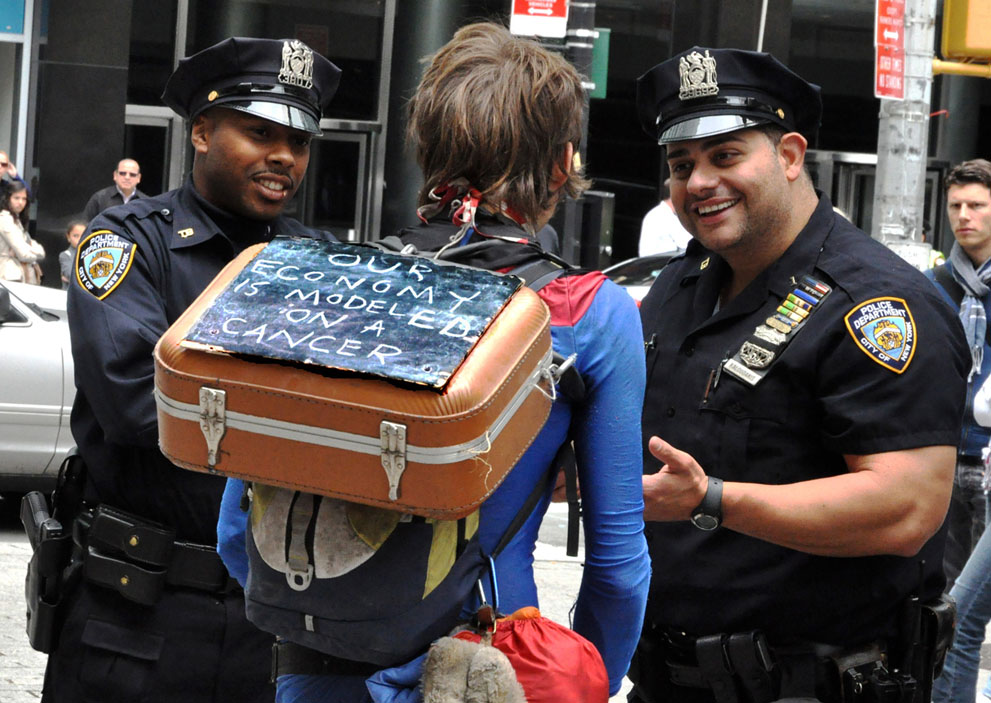Today, Occupy Wall Street turns one month old. Since September 17th, its outrage at the banking and financial sector has resonated with thousands of frustrated individuals within and without American borders.
I can admit, walking around Zucotti Park on that overcast first day of the occupation, that I did not give the movement much of a chance. It was too much of the introverted radical scene I had circulated among since my mid-teens, too youth-oriented and shamelessly idealistic. I loved it, but I did not see 20,000 marching on City Hall just two weeks after. I did not see Occupy Des Moines.
Writing about a movement in the moment is incredibly difficult. You can record an event journalistically, but it takes great skill to actually capture a sense of the dynamism involved in something that explodes with such populist fervor. A movement can make even the most gifted writer come off like an idiot scribbling platitudes.
Here are a few pieces that rise above the noise to provide clarity, insight, and a deep regard for their subject.
• STEVE ALMOND, “Occupy Your Conscience: A Rumpus Exaltation,” The Rumpus. October 11th.
“The Occupy Wall Street movement is an effort to identify the perpetrators. It takes direct aim at the financial speculators and corporations who caused the economic implosion of 2008, the corrosive influence of money in our political system, and the obscene economic inequality this influence has wrought.
It consists of citizens – mostly progressives, but also independents and conservatives – who decided spontaneously to take to the streets. They were not exhorted by for-profit demagogues, or chauffeured to the site in luxury buses airbrushed with focus-grouped slogans.
They take their inspiration, at least in part, from the protests of the Arab Spring. They are not seeking to overthrow the government. They are simply tired of listening to politicians parrot the sick myth that unfettered greed will lead to shared prosperity. Their prospectus is that of Jesus of Nazareth, not Karl Marx.”
• JASPER BERNES, JOSHUA CLOVER, and ANNIE McCLANAHAN, “Percentages, Politics, and the Police,” Los Angeles Review of Books, October 15th.
“It is hard to imagine anyone denying that it would be a good thing if the police were to take the side of the occupations. This is a far cry, however, from the belief that such a thing could reasonably happen. We must distinguish between analysis — an analysis of the concrete situation and accompanying historical record — and wish fulfillment fantasy. The latter tends, after all, to lead toward quite disastrous strategic and tactical decisions. In Tahrir Square — a place and idea toward which the Occupy movement swears fidelity — there was, despite some folks’ hysterical amnesia on this score, no commitment to non-violence, no gesture of complicity with the police, and no hesitation in resisting the government’s armed thugs. The Egyptians understood with clarity who their antagonists were, what their relationship to them was, and what would be needed to prevent the movement from being crushed by the folks with the guns and clubs.
The argument that “the cops will eventually come to sweep us away” may seem to open onto the conclusion “thus the cops must be befriended” — but only if one somehow suppresses the very reasons that the cops will come in the first place, and the long history of the police in relation to popular militancy. Cairo is one such example; others multiply throughout history. On the other side of the ledger: few entries indeed. It is true that armies and navies have been known to take the side of the people in revolutionary moments, but they are in the business of taking and holding territory, a portable trade. Police are charged with disciplining populations. Were they to take the side of the population, they would be without a trade. Any serious reading of history suggests that the police everywhere maintain their fidelity to the task of performing as bodyguards for money, property, and power.”
[UPDATE: Here is a really good response by Jeremy Kessler. Intellectuals all up in this shit!]
• ELI SCHMITT, “#occupywallstreet,” N + 1, September 27th.
“A few days later, as I was trying to write this piece, I came across a passage in George Eliot: “For in general mortals have a great power of being astonished at the presence of an effect towards which they have done everything, and at the absence of an effect towards which they have done nothing but desire it.” Was this us? Are we living and working in a city where in order to subsist, we must cooperate with the very injustices our demands were attempting to combat? A friend I saw that night asked derisively, “What were you protesting?” Then he laughed and added, “What weren’t you protesting?” Is the whole thing stupid?
There is a temptation to say yes. Since Saturday, it has been harder for me to remain hesitant, to maintain my uncertainty about whether the people still occupying Liberty Plaza are succeeding, or could succeed, or even what they might succeed at. We still don’t know exactly what the demands are. One of the members of our group, in discussing the criteria for a good demand, noted that Americans like to “get something” out of a political action. Repeal, enact, ban. We want visible, measurable outcomes. But we have no Mubarak, no Qaddafi. We are the country that reelected Bush, that bailed out the banks, that has stalemates in Congress about paltry tax increases. Our partial joblessness and alienating democratic system may be very real, our reasons for congregating concrete, but the precise causes of our distress are still far off, the specific solutions perhaps further.”
• SLAVOJ ZIZEK, taken from a speech in Zucotti Park on October 9th.
“Communism failed absolutely. But the problems of the commons are here. They are telling you we are not Americans here. But the conservative fundamentalists who claim they are really American have to be reminded of something. What is Christianity? It’s the Holy Spirit. What’s the Holy Spirit? It’s an egalitarian community of believers who are linked by love for each other. And who only have their own freedom and responsibility to do it. In this sense the Holy Spirit is here now. And down there on Wall Street there are pagans who are worshipping blasphemous idols. So all we need is patience. The only thing I’m afraid of is that we will someday just go home and then we will meet once a year, drinking beer, and nostalgically remembering what a nice time we had here. Promise ourselves that this will not be the case.
We know that people often desire something but do not really want it. Don’t be afraid to really want what you desire.”
• OLIVIA ROSANE, “Inside Occupy Wall Street’s Nearly Last Night,” Yes! Magazine, October 15th.
“I left that morning feeling that Occupy Wall Street had proven that it had created something worth defending—no small feat in a country where protest has followed the basic pattern: get a permit, make your complaint, go home. But if it is to grow, the Occupy Wall Street movement does need to think about how it can effectively challenge the injustices occurring outside of the community it has created and maintained.
Saturday’s international day of action was a good start, spawning demonstrations in some 900 cities worldwide and drawing large crowds to New York’s Time’s Square and Washington Square Park. As I joined the thousands gathered in Washington Square Park for a General Assembly Saturday night, I found myself agreeing with Columbia Professor Gayatri Spivak as she addressed the group through the people’s mic, explaining that she felt the ultimate goal of the protests was to separate politics from money. ‘Don’t let just survival, especially as winter is coming, be enough of a victory,’ she said.”
Happy one-month birthday, Occupy Wall Street.
This post may contain affiliate links.








